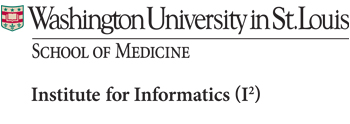2023 ICTS Symposium event post
Keynote Speakers
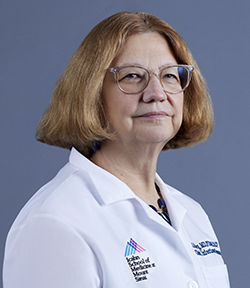
Judith A. Aberg, MD, FIDSA, FACP
Dr. George Baehr Professor of Medicine
Dean of System Operations for Clinical Sciences
System Chief, Infectious Diseases
Icahn School of Medicine at Mount Sinai
Aberg is the Dean of System Operations for Clinical Sciences, System Chief of Infectious Diseases, and Dr. George Baehr Professor of Medicine at the Icahn School of Medicine at Mount Sinai. An internationally renowned expert in infectious disease and clinical trials, she also serves as a Dean working with others to introduce and integrate clinical and translational research across the Mount Sinai Health System. Aberg was an integral part of Mount Sinai’s COVID-19 response, from introducing antiviral and immunomodulating therapies to opening vaccine studies. She has been involved in more than 200 clinical trials and currently serves as a member of the NIH COVID-19 Treatment Guidelines panel.

Charles P. Friedman, PhD
Josiah Macy Jr. Professor of Medical Education
Chair, Department of Learning Health Sciences
University of Michigan Medical School
Friedman is the Josiah Macy Jr. Professor of Medical Education and Chair of the Department of Learning Health Sciences at the University of Michigan Medical School. His academic interests focus on the concept of Learning Health Systems that improve health by marrying discovery to implementation, and the socio-technical infrastructure required to sustain these systems. He is editor-in-chief of the open-access journal Learning Health Systems and co-chair of the global movement to Mobilize Computable Biomedical Knowledge. Prior roles include executive positions at the Office of the National Coordinator for Health IT (ONC) in the U.S. Department of Health and Human Services and Associate Vice Chancellor for Biomedical Informatics and Founding Director of the Center for Biomedical Informatics at the University of Pittsburgh.
Panel Discussants and Moderators
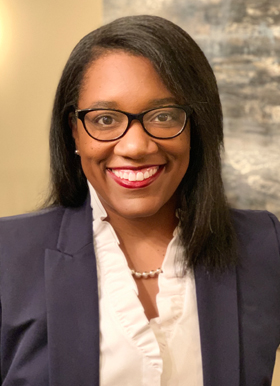
Bettina Drake, PhD, MPH
Professor of Surgery
Associate Director of Community Outreach and Engagement
Siteman Cancer Center
Washington University School of Medicine in St. Louis
Drake is Professor in the Division of Public Health Sciences at Washington University School of Medicine and Associate Director of Community Outreach and Engagement for the Alvin J. Siteman Cancer Center. Her research focuses on identifying preventive strategies and integrating community engagement approaches to reduce cancer disparities. The objectives of her research program are: to utilize community-based approaches to design, implement and disseminate research information; to promote education and awareness of research participation in minority communities; and to identify the modifiable and non-modifiable risk factors for cancer and other chronic diseases as well as the at-risk groups for these factors.

Clay Dunagan, MD, MS
Professor of Medicine
Washington University School of Medicine in St. Louis
Dunagan is Professor of Medicine with an appointment in the Division of Infectious Diseases. He served as a corporate officer and clinical leader for BJC HealthCare where he served as the vice president for quality from 1994 until 2015 and as senior vice-president and chief clinical officer from 2015 to 2023. Dungan worked collaboratively with Washington University Physicians in overseeing the development of evidence-based approaches to care, including the meaningful use of health information technology to support care; strategies to improve care integration across the continuum of services offered by the health system; and accountability measures for outcomes at the individual clinician, hospital and system levels.
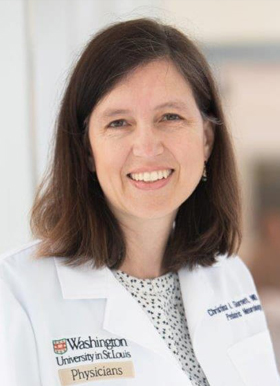
Christina Gurnett, MD, PhD
A. Ernest and Jane G. Stein Professor of Developmental Neurology
Professor of Neurology, Pediatrics
Associate Director, Institute of Clinical and Translational Sciences
Director, Division of Pediatric and Developmental Neurology
Neurologist-in-Chief, St. Louis Children’s Hospital
Washington University School of Medicine in St. Louis
Gurnett is a physician-scientist who is the Co-Director of the Washington University Intellectual and Developmental Disabilities Research Center. She completed her MD and PhD degrees at the University of Iowa and came to Washington University School of Medicine in 2000 for neurology residency and a clinical neurophysiology fellowship. Since 2014, she has co-directed the precision medicine pathway for graduate students. She has an active research laboratory whose goals include gene discovery for musculoskeletal disorders and the development of high throughput methods to improve variant interpretation. She is also the co-PI for two RADx-UP Return to School testing projects for COVID-19.
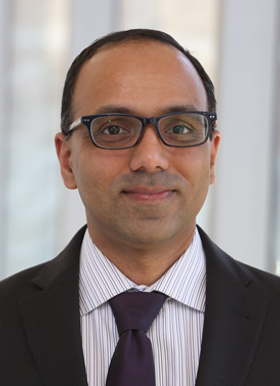
Thomas Kannampallil, PhD
Associate Professor of Anesthesiology
Faculty, Institute for Informatics, Data Science and Biostatistics (I2DB)
Associate Chief Research Information Officer
Washington University School of Medicine in St. Louis
Kannampallil is an Associate Professor of Anesthesiology and the Associate Chief Research Information Officer at Washington University School of Medicine. His research interests lie at the intersection of computer science, cognitive science, and clinical informatics. His research focuses on developing and evaluating intelligent computational tools for improving clinical decision making and patient safety. He currently serves on ONC and PCORI technical expert panels on health information technology. His research is funded by R01s from the National Library of Medicine, National Institute of Aging, and the Agency for Healthcare Research and Quality. He was elected as a Fellow of the American Medical Informatics Association in 2021.
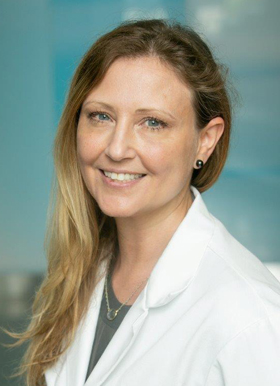
Ginger Nicol, MD
Associate Professor of Psychiatry
Director, Child and Adolescent Psychiatry Residency Research Education Program
Director, Mobile Health Research Core
Washington University School of Medicine in St. Louis
Nicol is an Associate Professor of Psychiatry at Washington University School of Medicine where she and her team in the Healthy Mind Lab employ precision methods such as digital and genetic phenotyping, PET imaging and functional MRI to better understand how medical and behavioral treatments work to optimize human mental and physical health. She directs the Mobile Health Research Core, part of the WUSM Institute of Clinical and Translational Sciences and co-directs the Psychiatry Residency Research Education Program. She is a Certified Eating Disorder Specialist and is board certified in Obesity Medicine.
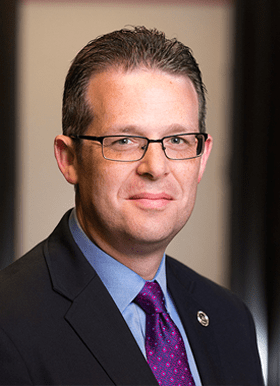
Philip R. O. Payne, PhD, FACMI, FAMIA, FAIMBE, FIAHSI
Janet and Bernard Becker Professor and Director, Institute for Informatics, Data Science and Biostatistics (I2DB)
Associate Dean for Health Information and Data Science
Chief Data Scientist, School of Medicine
Professor of Medicine, Computer Science and Engineering Washington University in St. Louis
Payne is the author of over 230 publications, and his research, innovation, and workforce development experience spans a broad spectrum, including: 1) machine learning and cognitive computing approaches to the discovery and analysis of bio-molecular and clinical phenotypes; 2) interventional approaches to the use of electronic health records and clinical decision support systems; 3) human factors and workflow issues surrounding the optimal use of healthcare information technology; and 4) the design and evaluation of data sharing and analytics platforms that enable the operation of agile, high-value healthcare delivery systems and research enterprises. Payne has a substantial track record of entrepreneurship, having launched and led numerous start-up and spin-off companies focusing on the broad digital health domain.
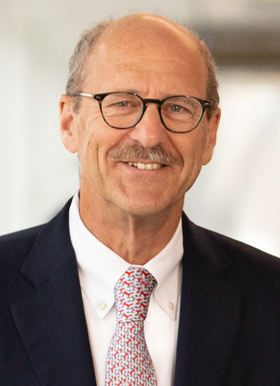
David H. Perlmutter, MD
Executive Vice Chancellor for Medical Affairs
George and Carol Bauer Dean, School of Medicine
Spencer T. and Ann W. Olin Distinguished Professor
Washington University School of Medicine in St. Louis
Perlmutter is internationally recognized for his research on alpha-1 antitrypsin deficiency, a genetic disorder in which accumulations of a misfolded protein can cause severe liver damage. His work has led to advances in the understanding of how cells dispose of misfolded proteins that cause cellular dysfunction. Perlmutter has been on the faculties of Harvard Medical School, University of Pittsburgh and Washington University. Prior to his current position, he was distinguished professor and chair of the Department of Pediatrics at University of Pittsburgh as well as physician-in-chief and scientific director of the Children’s Hospital of Pittsburgh of the University of Pittsburgh Medical Center.
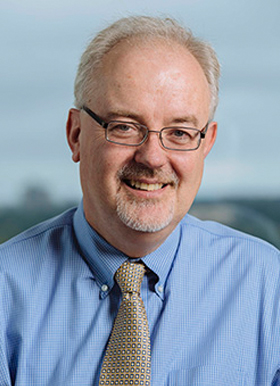
William Powderly, MD
J. William Campbell Professor of Medicine
Associate Dean for Clinical and Translational Sciences
Director, Institute of Clinical and Translational Sciences
Larry J. Shapiro Director, Institute for Public Health
Co-Director of the Division of Infectious Diseases
Washington University School of Medicine in St. Louis
Powderly is currently director of the Washington University Institute for Public Health, director of the Institute of Clinical and Translational Sciences, and co-director of the Division of Infectious Diseases. He has been actively involved in HIV-related clinical research for thirty years. He has been a member of numerous advisory groups on HIV and infectious diseases for the NIH, the CDC, the Canadian Institute for Health Research, and the European Medicines Agency. His major recent focus is translating scientific advances to a wider population to improve public health.
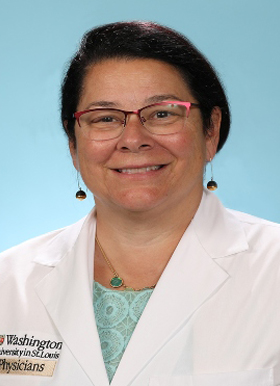
Nancy Sweitzer, MD, PhD
Professor of Medicine
Vice-Chair of Medicine for Clinical Research
Associate Director, Institute of Clinical and Translational Sciences
Washington University School of Medicine in St. Louis
Sweitzer is an advanced heart failure and transplant cardiologist recognized for clinical trials leadership. She has done extensive work on heart failure with preserved systolic function, a disease that affects older women disproportionately. Before joining the faculty at WashU, she was director of the University of Arizona Sarver Heart Center and chief of cardiology in Tucson. She recently completed a term as chair of the NHLBI Clinical Trials Study Section. Sweitzer earned her undergraduate degree at Penn, her MD at UW-Madison, and trained at Brigham and Women’s Hospital.

Yi Zhang, RN, JD
Assistant Dean for Clinical Research
Administrative Director, Center for Clinical Studies
Operations Officer, Clinical and Translational Research Unit
Director, Clinical Research in Oncology
Washington University School of Medicine in St. Louis
Zhang has expertise in clinical research, and operational, regulatory, legal, ethical and practical issues faced by clinical research investigators and staff. She has served the ICTS in different capacities across several domains and cores. Currently, she serves as the operations officer for the Clinical and Translational Research Unit and the co-director of the Regulatory Knowledge and Support Center, as well as playing a major role in the ICTS’ Network Capacity component.
Keynote Speakers

Judith A. Aberg, MD, FIDSA, FACP
Dr. George Baehr Professor of Medicine
Dean of System Operations for Clinical Sciences
System Chief, Infectious Diseases
Icahn School of Medicine at Mount Sinai
Aberg is the Dean of System Operations for Clinical Sciences, System Chief of Infectious Diseases, and Dr. George Baehr Professor of Medicine at the Icahn School of Medicine at Mount Sinai. An internationally renowned expert in infectious disease and clinical trials, she also serves as a Dean working with others to introduce and integrate clinical and translational research across the Mount Sinai Health System. Aberg was an integral part of Mount Sinai’s COVID-19 response, from introducing antiviral and immunomodulating therapies to opening vaccine studies. She has been involved in more than 200 clinical trials and currently serves as a member of the NIH COVID-19 Treatment Guidelines panel.

Charles P. Friedman, PhD
Josiah Macy Jr. Professor of Medical Education
Chair, Department of Learning Health Sciences
University of Michigan Medical School
Friedman is the Josiah Macy Jr. Professor of Medical Education and Chair of the Department of Learning Health Sciences at the University of Michigan Medical School. His academic interests focus on the concept of Learning Health Systems that improve health by marrying discovery to implementation, and the socio-technical infrastructure required to sustain these systems. He is editor-in-chief of the open-access journal Learning Health Systems and co-chair of the global movement to Mobilize Computable Biomedical Knowledge. Prior roles include executive positions at the Office of the National Coordinator for Health IT (ONC) in the U.S. Department of Health and Human Services and Associate Vice Chancellor for Biomedical Informatics and Founding Director of the Center for Biomedical Informatics at the University of Pittsburgh.
Panel Discussants and Moderators

Bettina Drake, PhD, MPH
Professor of Surgery
Associate Director of Community Outreach and Engagement
Siteman Cancer Center
Washington University School of Medicine in St. Louis
Drake is Professor in the Division of Public Health Sciences at Washington University School of Medicine and Associate Director of Community Outreach and Engagement for the Alvin J. Siteman Cancer Center. Her research focuses on identifying preventive strategies and integrating community engagement approaches to reduce cancer disparities. The objectives of her research program are: to utilize community-based approaches to design, implement and disseminate research information; to promote education and awareness of research participation in minority communities; and to identify the modifiable and non-modifiable risk factors for cancer and other chronic diseases as well as the at-risk groups for these factors.

Clay Dunagan, MD, MS
Professor of Medicine
Washington University School of Medicine in St. Louis
Dunagan is Professor of Medicine with an appointment in the Division of Infectious Diseases. He served as a corporate officer and clinical leader for BJC HealthCare where he served as the vice president for quality from 1994 until 2015 and as senior vice-president and chief clinical officer from 2015 to 2023. Dungan worked collaboratively with Washington University Physicians in overseeing the development of evidence-based approaches to care, including the meaningful use of health information technology to support care; strategies to improve care integration across the continuum of services offered by the health system; and accountability measures for outcomes at the individual clinician, hospital and system levels.

Christina Gurnett, MD, PhD
A. Ernest and Jane G. Stein Professor of Developmental Neurology
Professor of Neurology, Pediatrics
Associate Director, Institute of Clinical and Translational Sciences
Director, Division of Pediatric and Developmental Neurology
Neurologist-in-Chief, St. Louis Children’s Hospital
Washington University School of Medicine in St. Louis
Gurnett is a physician-scientist who is the Co-Director of the Washington University Intellectual and Developmental Disabilities Research Center. She completed her MD and PhD degrees at the University of Iowa and came to Washington University School of Medicine in 2000 for neurology residency and a clinical neurophysiology fellowship. Since 2014, she has co-directed the precision medicine pathway for graduate students. She has an active research laboratory whose goals include gene discovery for musculoskeletal disorders and the development of high throughput methods to improve variant interpretation. She is also the co-PI for two RADx-UP Return to School testing projects for COVID-19.

Thomas Kannampallil, PhD
Associate Professor of Anesthesiology
Faculty, Institute for Informatics, Data Science and Biostatistics (I2DB)
Associate Chief Research Information Officer
Washington University School of Medicine in St. Louis
Kannampallil is an Associate Professor of Anesthesiology and the Associate Chief Research Information Officer at Washington University School of Medicine. His research interests lie at the intersection of computer science, cognitive science, and clinical informatics. His research focuses on developing and evaluating intelligent computational tools for improving clinical decision making and patient safety. He currently serves on ONC and PCORI technical expert panels on health information technology. His research is funded by R01s from the National Library of Medicine, National Institute of Aging, and the Agency for Healthcare Research and Quality. He was elected as a Fellow of the American Medical Informatics Association in 2021.

Ginger Nicol, MD
Associate Professor of Psychiatry
Director, Child and Adolescent Psychiatry Residency Research Education Program
Director, Mobile Health Research Core
Washington University School of Medicine in St. Louis
Nicol is an Associate Professor of Psychiatry at Washington University School of Medicine where she and her team in the Healthy Mind Lab employ precision methods such as digital and genetic phenotyping, PET imaging and functional MRI to better understand how medical and behavioral treatments work to optimize human mental and physical health. She directs the Mobile Health Research Core, part of the WUSM Institute of Clinical and Translational Sciences and co-directs the Psychiatry Residency Research Education Program. She is a Certified Eating Disorder Specialist and is board certified in Obesity Medicine.

Philip R. O. Payne, PhD, FACMI, FAMIA, FAIMBE, FIAHSI
Janet and Bernard Becker Professor and Director, Institute for Informatics, Data Science and Biostatistics (I2DB)
Associate Dean for Health Information and Data Science
Chief Data Scientist, School of Medicine
Professor of Medicine, Computer Science and Engineering Washington University in St. Louis
Payne is the author of over 230 publications, and his research, innovation, and workforce development experience spans a broad spectrum, including: 1) machine learning and cognitive computing approaches to the discovery and analysis of bio-molecular and clinical phenotypes; 2) interventional approaches to the use of electronic health records and clinical decision support systems; 3) human factors and workflow issues surrounding the optimal use of healthcare information technology; and 4) the design and evaluation of data sharing and analytics platforms that enable the operation of agile, high-value healthcare delivery systems and research enterprises. Payne has a substantial track record of entrepreneurship, having launched and led numerous start-up and spin-off companies focusing on the broad digital health domain.

David H. Perlmutter, MD
Executive Vice Chancellor for Medical Affairs
George and Carol Bauer Dean, School of Medicine
Spencer T. and Ann W. Olin Distinguished Professor
Washington University School of Medicine in St. Louis
Perlmutter is internationally recognized for his research on alpha-1 antitrypsin deficiency, a genetic disorder in which accumulations of a misfolded protein can cause severe liver damage. His work has led to advances in the understanding of how cells dispose of misfolded proteins that cause cellular dysfunction. Perlmutter has been on the faculties of Harvard Medical School, University of Pittsburgh and Washington University. Prior to his current position, he was distinguished professor and chair of the Department of Pediatrics at University of Pittsburgh as well as physician-in-chief and scientific director of the Children’s Hospital of Pittsburgh of the University of Pittsburgh Medical Center.

William Powderly, MD
J. William Campbell Professor of Medicine
Associate Dean for Clinical and Translational Sciences
Director, Institute of Clinical and Translational Sciences
Larry J. Shapiro Director, Institute for Public Health
Co-Director of the Division of Infectious Diseases
Washington University School of Medicine in St. Louis
Powderly is currently director of the Washington University Institute for Public Health, director of the Institute of Clinical and Translational Sciences, and co-director of the Division of Infectious Diseases. He has been actively involved in HIV-related clinical research for thirty years. He has been a member of numerous advisory groups on HIV and infectious diseases for the NIH, the CDC, the Canadian Institute for Health Research, and the European Medicines Agency. His major recent focus is translating scientific advances to a wider population to improve public health.

Nancy Sweitzer, MD, PhD
Professor of Medicine
Vice-Chair of Medicine for Clinical Research
Associate Director, Institute of Clinical and Translational Sciences
Washington University School of Medicine in St. Louis
Sweitzer is an advanced heart failure and transplant cardiologist recognized for clinical trials leadership. She has done extensive work on heart failure with preserved systolic function, a disease that affects older women disproportionately. Before joining the faculty at WashU, she was director of the University of Arizona Sarver Heart Center and chief of cardiology in Tucson. She recently completed a term as chair of the NHLBI Clinical Trials Study Section. Sweitzer earned her undergraduate degree at Penn, her MD at UW-Madison, and trained at Brigham and Women’s Hospital.

Yi Zhang, RN, JD
Assistant Dean for Clinical Research
Administrative Director, Center for Clinical Studies
Operations Officer, Clinical and Translational Research Unit
Director, Clinical Research in Oncology
Washington University School of Medicine in St. Louis
Zhang has expertise in clinical research, and operational, regulatory, legal, ethical and practical issues faced by clinical research investigators and staff. She has served the ICTS in different capacities across several domains and cores. Currently, she serves as the operations officer for the Clinical and Translational Research Unit and the co-director of the Regulatory Knowledge and Support Center, as well as playing a major role in the ICTS’ Network Capacity component.
| 8:30 am | Attendee check-in |
| 9:00-9:25 am | Welcome by ICTS Director William Powderly, MD School of Medicine Remarks by Dean David Perlmutter, MD ICTS Update and Future Directions Dr. Powderly will highlight ICTS achievements and discuss future initiatives as the ICTS embarks upon its 16th year of consecutive funding from the National Center for Advancing Translational Sciences. Winners of the poster competition will be announced. |
| 9:25-10:00 am | Introduction by Philip Payne, PhD Charles Friedman, PhD “Socio-Technical Infrastructure for Learning Health Systems” One of three key defining features of a Learning Health System is infrastructure which serves the needs of all system activities to improve the health of individuals and populations. The infrastructure can be thought of as a set of services comprised of people, processes, policies, and technologies. Dr. Friedman will describe such an infrastructure and the specific services that comprise it. |
| 10:00-10:45 am | Q&A and Panel with Dr. Friedman Clay Dunagan, MD, MS; Thomas Kannampallil, PhD; Nancy Sweitzer, MD, PhD Moderated by Christina Gurnett, MD, PhD |
| 10:45-10:55 am | Break |
| 10:55-11:30 am | Introduction by William Powderly, MD Judith Aberg, MD “Operationalizing Clinical Trials in Health Systems” Dr. Aberg will discuss how to operationalize and facilitate the conduct of clinical trials across a health system, including advantages of centralizing certain processes, barriers to implementation, and thoughts of solutions. Lessons learned from the Mount Sinai experience will be highlighted. |
| 11:30 am-12:30 pm | Q&A and Panel with Dr. Aberg Bettina Drake, PhD, MPH; Ginger Nicol, MD; Yi Zhang, RN, JD Moderated by William Powderly, MD |
| 12:30-1:00 pm | Boxed lunches available. Poster award recipients available with their posters in lobby. |

